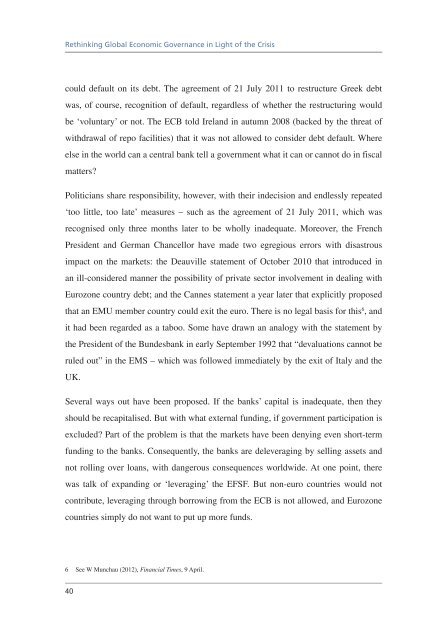Download PDF - Vox
Download PDF - Vox
Download PDF - Vox
- No tags were found...
Create successful ePaper yourself
Turn your PDF publications into a flip-book with our unique Google optimized e-Paper software.
Rethinking Global Economic Governance in Light of the Crisiscould default on its debt. The agreement of 21 July 2011 to restructure Greek debtwas, of course, recognition of default, regardless of whether the restructuring wouldbe ‘voluntary’ or not. The ECB told Ireland in autumn 2008 (backed by the threat ofwithdrawal of repo facilities) that it was not allowed to consider debt default. Whereelse in the world can a central bank tell a government what it can or cannot do in fiscalmatters?Politicians share responsibility, however, with their indecision and endlessly repeated‘too little, too late’ measures – such as the agreement of 21 July 2011, which wasrecognised only three months later to be wholly inadequate. Moreover, the FrenchPresident and German Chancellor have made two egregious errors with disastrousimpact on the markets: the Deauville statement of October 2010 that introduced inan ill-considered manner the possibility of private sector involvement in dealing withEurozone country debt; and the Cannes statement a year later that explicitly proposedthat an EMU member country could exit the euro. There is no legal basis for this 6 , andit had been regarded as a taboo. Some have drawn an analogy with the statement bythe President of the Bundesbank in early September 1992 that “devaluations cannot beruled out” in the EMS – which was followed immediately by the exit of Italy and theUK.Several ways out have been proposed. If the banks’ capital is inadequate, then theyshould be recapitalised. But with what external funding, if government participation isexcluded? Part of the problem is that the markets have been denying even short-termfunding to the banks. Consequently, the banks are deleveraging by selling assets andnot rolling over loans, with dangerous consequences worldwide. At one point, therewas talk of expanding or ‘leveraging’ the EFSF. But non-euro countries would notcontribute, leveraging through borrowing from the ECB is not allowed, and Eurozonecountries simply do not want to put up more funds.6 See W Munchau (2012), Financial Times, 9 April.40














